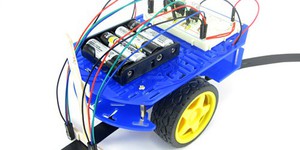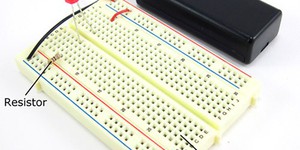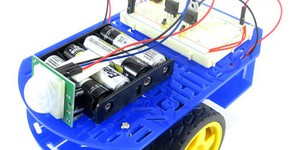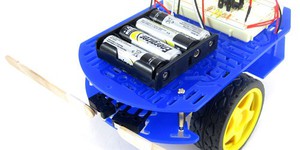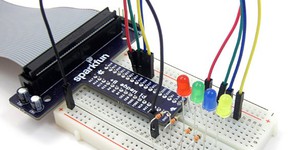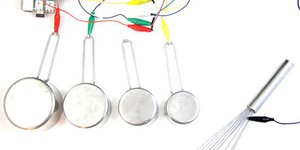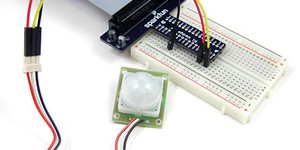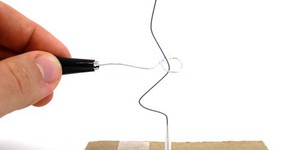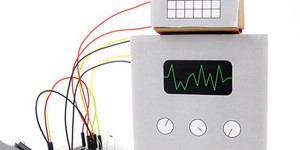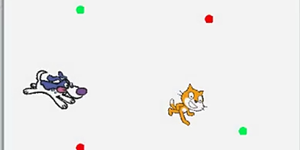How to Use a Breadboard
Log In
Want to learn more? Check out these other resources:
Lesson Plan
Grade: 6th-8th
Have your students read about autonomous (also called self-driving or driverless) cars in the news? How can you build a car or a robot that will stay on the road without a human driver? In this project, your students will find out by building a robot that can automatically follow a line around a homemade race course, while learning about the electromagnetic spectrum and electronic circuits.
Read more
NGSS Performance Expectations:
- MS-PS4-2. Develop and use a model to describe that waves are reflected, absorbed, or transmitted through various materials.
Project Resource
Many electronics projects use something called a breadboard. What is a breadboard, and how do you use it? This tutorial video will give you a basic introduction to breadboards and explain how to use them in beginner electronics projects; you can also read more details and see more examples in the text sections.
More About Breadboards
Introduction
What is a breadboard?
Where does the name "breadboard" come from?
Are there different kinds of breadboards?
What is a "solderless"…
Read more
Have you ever seen a cat chase a laser pointer or a flashlight beam? What if you could make a robot do that? In this project, you will build a robot that can automatically drive toward a bright light source. The robot uses a simple electronic circuit to track light, so there is no computer programming required! You can also do three other robotics projects using the same kit of parts, so this is a great way to get started with robotics before moving on to more advanced projects.
Read more
How easy is it for you to walk along and follow a line that is painted on the ground? Simple, right? You might be able to follow a line without giving it much thought, but how could a robot do that? In this project, you will build your own automatic line-following robot that can race around a track that you create. This technology has plenty of real-world applications—maybe one day you could help design self-driving cars!
Read more
Do you ever wish you could hire someone to guard your favorite toys, or keep certain people from coming into your room? What if you could make a robot to do it for you? This project will show you how to build a simple security robot controlled by a motion-detecting sensor. When someone comes near your valuables or enters the room, the robot will spring to life and (hopefully) scare them away!
Read more
In the animal kingdom, many different critters use whiskers to help them find their way around in the dark, through murky waters, or even to help them hunt prey. Whiskers can be very useful when the animals cannot rely on sight. Did you know that you can also build a robot that uses "whiskers" to find its way around? This project will show you how to build a simple robot that uses whiskers as "bump sensors" to help the robot detect when it is about to bump into an obstacle, so it can turn…
Read more
Lights and music make a great combination! Getting sound and lights to complement each other just right helps set the mood for everything from DJ parties and concerts, to theater shows, the circus, and ballet performances. You can put together your own lights and music show using
a Raspberry Pi.
Check out the video to see what this simple, but fun, project looks like:
Once you have the basics down, you can keep tinkering with the circuit, the sounds, and the program to make fancier…
Read more
When you were little, did you ever make "music" in your kitchen by banging kitchen utensils on pots and pans? What if you could actually take those kitchen implements now, and play them with different sound effects? In this project, you can convert basic kitchen utensils into your own electronic drum set using
a Raspberry Pi.
Check out the video to see what this simple, but fun, project looks like:
Read more
Have you ever wished you could create an alarm system to guard your stuff? Or what about throwing a surprise party for someone and automatically playing music and flashing lights when they walk in the door? You can do either of these things using
a Raspberry Pi.
The kit includes a motion sensor, which can detect when people move in front of it. Check out the video to see what this simple, but fun, project looks like:
Read more
Have you ever played a game that tested the steadiness of your hands? Operation® is a popular board game that requires you to perform "surgery" without bumping a tool against the edges of the game. There are also popular amusement park or carnival games where you try to move a metal loop along a wavy metal wire without letting the two touch. You can build your own version of these games using
a Raspberry Pi.
Check out the video to see what this simple, but fun, project looks like:
Read more
Have you ever seen night lights that automatically turn on when it gets dark? What about art projects, like paintings or sculptures, with embedded lights? This project will let you combine the two, by adding lights to an art project of your choice. You can make the lights automatically turn on when it gets dark using
a Raspberry Pi.
Check out the video to see what this simple, but fun, project looks like:
Read more
Did you ever have a favorite toy like an action figure or doll that could light up, make noise, or move? This project will show you how to make your own interactive toy using
a Raspberry Pi.
Check out the video to see what this simple, but fun, project looks like. The version you make does not have to be a robot; it can be any shape and have any sound effects you want.
Read more
Do you play video games on a console or smartphone? Have you ever wished you had the power to change how a game worked, or even to create your very own game? This project will show you how to make your very own video game and controller using
a Raspberry Pi.
Check out the video to see what this simple, but fun, project looks like. Of course, you can design the looks and gameplay of your game any way you like!
Read more
Have you ever used a toy like a Spirograph® to draw precise, repeatable patterns on a piece of paper? What if you could use a computer to automatically draw the patterns for you? This project will show you how to do just that using
a Raspberry Pi.
Check out the video to see what this simple, but fun, project looks like:
Read more
Have you ever accidentally burned out an LED while building a circuit? What about doing it on purpose—for science, of course! In this science project, you will intentionally send too much current through LEDs to see if they will burn out or even explode! How much current does it take to destroy an LED? How does this compare to the LED's rated current value? Try this project and find out! Check out this page for more LED science projects.
Read more
Blog Post
Using a breadboard is an important "next step" in exploring circuits and electronics STEM projects. Try one of these ten Science Buddies projects to get to know your breadboard and start building circuits with confidence.
Breadboards! A simple way to take circuits and electronics projects to the next level!
Students who are just getting started exploring electronics often begin with basic circuits in which batteries are connected directly to motors or…
Read more
Explore Our Science Videos
Marble Machine: 2016 Engineering Challenge
Two-Stage Balloon Rocket Introduction
Turn Milk into Plastic! Lesson Plan Introduction



